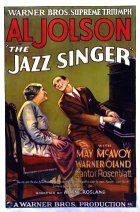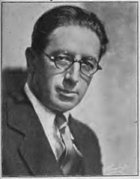
The Jazz Singer Page #2
- UNRATED
- Year:
- 1927
- 88 min
- 1,327 Views
The father looks at him as though not willing to believe his ears. He
has never heard anything quite so blasphemous. He gulps a few times and
then, with a grimly sarcastic smile, he says:
TITLE 7:
"And if not a cantor, what are you going to be?"He looks at the boy, awaiting an answer to a question which he regards
as unanswerable.
34.CLOSE-UP BOY
He swallows a few times, then looking up at his father courageously, he
declares:
TITLE 8:
"I want to be a singer in a theayter."He half ducks as if expecting a blow.
35.CLOSE-UP CANTOR
He looks at the boy in amazement, his hands going aloft in horror. It is
difficult for him to speak. Finally he breaks out:
TITLE 9:
"For five generations there has been aRabinowitz as cantor -- I have taught you to be
one--"
He pauses for a breath, then, sticking out his bristling beard in the
boy's direction, he almost yells:
TITLE 10:
"And you -- you want to be a common actor in alowlife theayter!"
The father makes as though to strike the boy, who this time stands his
ground bravely. The hand of the aged man is raised for the blow, but he
halts it in mid air. The father looks down into the eyes of the boy,
which are fixed steadfastly on him. He shakes his head sorrowfully.
FADE OUT:
FADE IN:
37.INT. MULLER'S CAFE
Long shot discloses one of those places so common in New York before
Prohibition, a long bar in front, and behind, separated from the bar by
a partition and swinging doors, a "garden" approachable from the "family
entrance" where "ladies" may dine and drink their beer, whether with
escorts or without them. The back of the place can be seen faintly. The
bar is being well patronized, and the three German bartenders are busy
putting out huge schooners of the amber fluid. Waiters are going in and
out of the swinging doors.
Looking toward the bar, there is a battered old piano in the foreground
on a slightly raised platform, at which sits a young man who looks twice
his age because of dissipation. He is smoking a cigarette in a listless
manner, and there is a schooner of beer on the piano at the end of the
keyboard. He is running his hands over the keys as though playing to
himself. Back of him may be seen the diners and drinkers. There is an
occasional family group and several of the tables are occupied by
flashily dressed women of an obviously well-known occupation. Some are
accompanied by men. At other tables are men alone quietly drinking.
39.CLOSE-UP FAMILY ENTRANCE
Seen from the inside, the door opens slowly and the head of Jakie
Rabinowitz appears. He looks about as though to see if the coast is
clear, then enters. His attitude indicates that he has been there
before.
40.FULL SHOT GARDEN
Jakie threads his way among the tables to the piano. Several of the
drinkers look at him as they recognize the boy, and there is some
conversation about him among the groups. Jakie calls to the piano
player, who swings around to greet him, as he gets on the platform.
41.CLOSE SHOT FLAYER AND JAKIE
The pianist greets Jakie jocularly:
TITLE 11:
"Well how's the kid Caruso today?"Jakie answers him in kind:
TITLE 12:
"Great! How's old kid Paderooski?"They laugh and the piano player indicates the diners and drinkers,
saying that maybe there's a few dimes for the kid in the place. They
confer a moment, then the piano player whirls around and strikes a
chord.
42.FULL SHOT GARDEN
Those at the tables look toward the piano with interest as Jakie, in the
background, is seen standing on the little platform facing them.
43.MED. SHOT BOY AND PIANO PLAYER
The player plays the introduction to "Mighty Lak a Rose" and the boy
starts to sing. (The various shots for this will have to be in
accordance with Vitaphone technique and its necessities.) Vitaphone
singing stops, when cut is made.
FADE IN:
44.INT. RABINOWITZ LIVING ROOM
It is a rather large room for that locality, the living room and dining
room of the modest flat occupied by the cantor and his family. The
furniture is good but old, and there are many shelves and tables which
are filled with knickknacks, china, glassware, and silver. Mrs.
Rabinowitz, a sweet-faced, motherly woman of between forty-five and
fifty, is just setting the table. It is the day of the eve of Atonement
Day, the most important holiday of Judaism, which is observed by even
the least religious of Jews, by twenty-four hours of abstinence from
food or drink. The cantor is pacing up and down the room in a very
nervous manner. He pauses occasionally to make a quick remark,
punctuated by an elaborate gesture, then resumes his pacing. The subject
of his remarks is Jakie.
TITLE 13:
Sara Rabinowitz was not as learned in the loreof her race as her husband, but she had a
deeper and better understanding of life -- and
Jakie.
45.CLOSE-UP MOTHER
She is setting plates on the table as she listens to the cantor. She
hesitates, then says:
TITLE 14:
"Jakie is a good boy, Papa -- but maybe heshouldn't be a cantor."
46. MED. SHOT BOTH
As Sara finishes title and resumes her work, the cantor stops and looks
at her in amazement. He starts to say: "What, not a cantor, you say
that?" Then he takes a long breath and, bringing his fist down through
the air, he breaks out into a stream of Yiddish.
47.CLOSE-UP CANTOR
He declares violently that Jakie must be a cantor, just like himself and
his fathers before him. He leans closer to his wife as he says, with
some semblance of pride:
TITLE 15:
"He knows all the songs and prayers even now sogood as I do. He could take my place yet
tonight and sing 'Kol Nidre' when Yom Kippur
begins."
He pauses as though awaiting an answer to what he considers an
unanswerable argument.
48.CLOSE-UP SARA
She nods her head in acquiescence of what her husband has said; then she
shakes her head slowly and replies:
TITLE 16:
"He has it all in his head, yes, but it is notin his heart. He is of America."
49.CLOSE SHOT BOTH
As she finishes the old man looks at her in horror. This which she has
said is, to him, treason. She turns her back as he begins to scold
breathlessly.
50.FULL SHOT CAFE FROM FRONT END OF BAR
(Vitaphone singing is resumed.) There are only a few people drinking at
the bar in the foreground. The "garden" is visible as people pass
through the swinging doors.
51.FULL SHOT GARDEN
As seen from the doors, Jakie is singing and the people at the tables
are watching and listening approvingly.
52.MED. SHOT BAR
A tall, spare Hebrew with a straggly beard and a cutaway coat comes into
the foreground. He orders a glass of beer, putting his nickel on the bar
as he does so.
53.CLOSE-UP YUDELSON
He drinks slowly and with relish.
TITLE 17:
Moisha Yudelson, a man of influence in thebusiness and religious affairs of the ghetto.
Back. He reaches over and takes some of the free lunch. His attention is
attracted to the music. He listens curiously, then starts for the door
to the garden.
54.MED. SHOT DOOR
Yudelson pushes the swinging door open, his glass of beer in one hand
and a slice of meat on a piece of bread in the other. His eyes bulge as
he sees the singer.
55.LONG REVERSE SHOT
Jakie is singing.
56.CLOSE-UP YUDELSON
His lips tighten. He determines that something must be done about this
and he knows just what it is. He goes quickly to the bar.
57.MED. SHOT BAR
Yudelson gulps down the beer, crams the rest of the food into his mouth,
and exits. (Vitaphone singing stops.)
58. INT. RABINOWITZ HOME
The cantor is walking up and down the floor nervously. Sara is putting
the dishes of food on the table. The cantor stops and faces Sara
sternly.
59.CLOSE-UP CANTOR
He takes out a huge silver watch, looks at it, and says:
TITLE 18:
"Tonight Jakie is to sing 'Kol Nidre' in schooland he isn't yet here."
Translation
Translate and read this script in other languages:
Select another language:
- - Select -
- 简体中文 (Chinese - Simplified)
- 繁體中文 (Chinese - Traditional)
- Español (Spanish)
- Esperanto (Esperanto)
- 日本語 (Japanese)
- Português (Portuguese)
- Deutsch (German)
- العربية (Arabic)
- Français (French)
- Русский (Russian)
- ಕನ್ನಡ (Kannada)
- 한국어 (Korean)
- עברית (Hebrew)
- Gaeilge (Irish)
- Українська (Ukrainian)
- اردو (Urdu)
- Magyar (Hungarian)
- मानक हिन्दी (Hindi)
- Indonesia (Indonesian)
- Italiano (Italian)
- தமிழ் (Tamil)
- Türkçe (Turkish)
- తెలుగు (Telugu)
- ภาษาไทย (Thai)
- Tiếng Việt (Vietnamese)
- Čeština (Czech)
- Polski (Polish)
- Bahasa Indonesia (Indonesian)
- Românește (Romanian)
- Nederlands (Dutch)
- Ελληνικά (Greek)
- Latinum (Latin)
- Svenska (Swedish)
- Dansk (Danish)
- Suomi (Finnish)
- فارسی (Persian)
- ייִדיש (Yiddish)
- հայերեն (Armenian)
- Norsk (Norwegian)
- English (English)
Citation
Use the citation below to add this screenplay to your bibliography:
Style:MLAChicagoAPA
"The Jazz Singer" Scripts.com. STANDS4 LLC, 2025. Web. 22 Feb. 2025. <https://www.scripts.com/script/the_jazz_singer_878>.







Discuss this script with the community:
Report Comment
We're doing our best to make sure our content is useful, accurate and safe.
If by any chance you spot an inappropriate comment while navigating through our website please use this form to let us know, and we'll take care of it shortly.
Attachment
You need to be logged in to favorite.
Log In